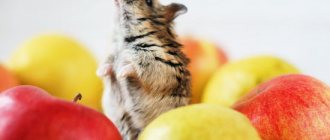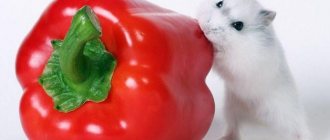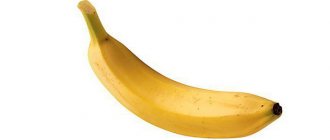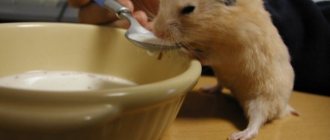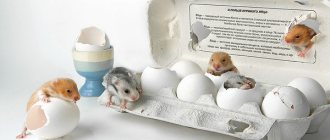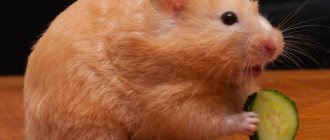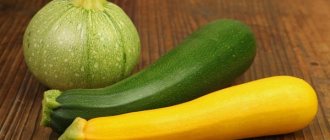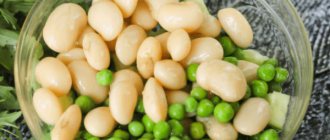The diet of hamsters in nature is not limited to cereals, fruits, and vegetables.
For proper nutrition, they also need protein foods. Let's consider whether hamsters can eat cheese as a product containing a lot of protein. Under natural conditions, rodents usually eat insects (grasshoppers, beetles, butterflies, etc.), as well as worms and larvae. To make up for the lack of protein food, it is recommended for pets to buy specialized food - bloodworms, mealworms, gammarus.
Some pet hamsters are reluctant to eat such complementary foods, and the owners try to supplement the pet's diet with products from their table. To understand whether you can give your hamster cheese, let’s look at the composition of the product in detail.
Cheese composition
Several products are used to make cheese - whole milk, sourdough and a special substance obtained from veal stomachs.
Article on the topic: Can hamsters eat black and white bread, pasta and crackers?
In addition to the main components, salt and other auxiliary components are used in the cheese making process - potassium nitrate, calcium chloride.
This list of ingredients in the manufacture of a dairy product is established by GOST. Today, unfortunately, the quality of such products has decreased significantly. Finding a finished product with such a composition is quite difficult. Most manufacturers use various additives, flavors and dyes, which can cause severe allergies and disruption of the gastrointestinal tract in a small rodent.
The third stage is “transitional” age
The first feeding of such food should be under human supervision, since babies may choke on unusual food.
The source of protein, which is so necessary for the younger generation, will be chopped boiled chicken protein. It is too early to give yolk to babies - their stomach is not yet ready for such heavy food.
The moment has come when you can pour the grain mixture into the feeder of the “young animals”
It is very important that the food is of high quality and fresh, otherwise the first grain complementary food may be the last for the younger generation
Useful properties of the product
When a hamster eats cheese, its body receives many beneficial substances:
- Protein is a vital component. It is a building material for cells and helps build muscle mass.
- Amino acids, which are contained in high-quality cheeses, increase the tiny body’s resistance to various infections (viral, bacterial and fungal). In addition, organic compounds are involved in metabolic processes and fermentation processes.
- Cheeses are rich in vitamins B, A, D. These beneficial components help improve immunity, normalize the functioning of the cardiovascular system and have a beneficial effect on the visual organs.
- The dairy product contains vital microelements - phosphorus, magnesium, calcium and potassium. These substances prevent the development of tumors, tone the muscular system and normalize the functioning of the nervous system.
So, if your pet enjoys eating such a treat, you should choose the safest and healthiest variety for him.
Dry food for hamsters
What do hamsters eat at home? The basis of the diet is dry food. They must always be present in the feeder. Food for rats, parrots, guinea pigs and other animals is not suitable for feeding.
This is due to the fact that vitamin supplements and the composition of specialized food fully meet the needs of the body. If you buy food for another animal, it will differ significantly both in composition and in the amount of nutrients. This can lead to disastrous consequences, since some components of such feeds can have a negative effect on the digestive system and the body as a whole.
Which varieties are prohibited?
Can hamsters eat cheese with a high content of fat, salt and seasonings? According to experts, such products are contraindicated for pets due to the development of diseases of the cardiovascular, renal and digestive systems. All this negatively affects the general condition of the domestic rodent and can provoke its death.
Not all cheeses are healthy
Processed cheeses
When asked whether a hamster can have this type of cheese, experienced livestock breeders answer that it is not possible. Because it contains fatty foods - cream, butter and milk. It is made on the basis of hard cheeses. Therefore, the fat content of the finished product is very high.
Article on the topic: How to determine the gender of a puppy
Moreover, some unscrupulous manufacturers add cheap vegetable substitutes, such as palm oil, instead of natural vegetable oils. And to improve the taste of such products, various flavors, seasonings and other additives are added.
Sausage cheese is a type of processed product. Its excellent taste and aroma is also achieved through various additives that are harmful to the health of the rodent.
Sweet processed cheese contains increased amounts of sugar, cocoa, and various sweeteners. They can cause the development of diabetes in a hamster, as well as many other diseases of the cardiovascular system.
Therefore, when asked whether it is possible to feed hamsters processed cheese, experts give an unequivocal answer - No!
Product with mold
This delicacy appeared in our country relatively recently, but is already very popular and in demand. Is it possible to give a hamster blue cheese? Of course not! Excessive consumption of moldy dairy products can provoke the development of dysbacteriosis and flatulence. The digestive tract will also suffer from such food. Therefore, you should not risk the health of your pet.
Even people are recommended to consume this product in limited quantities.
Boiled potatoes
As a rule, a certain amount of boiled food is recommended in the diet of hamsters, since they are digested faster and are more easily absorbed by the body. For potatoes, there is a certain “golden mean” recommended by experts in this matter.
A certain amount of boiled product is acceptable in the diet, but you should not get too carried away with it, as this can lead to a number of negative consequences due to the large amount of starch, namely the deposition of excess fat. Obesity negatively affects the functioning of the cardiovascular system, as well as the health of the body as a whole.
The best solution is for elderly animals to consume boiled potatoes, especially if you add cucumber and pumpkin to it. In this form, it will be easier for the old body to absorb food and cope with a number of toxins. The food is cooked briefly, without adding salt.
Features of feeding
We have already figured out that hamsters eat cheese and this product is not contraindicated for them. Now, let's find out how often and in what portions he eats such food.
Since such a product does not form the basis of a pet rodent’s diet, there is no need to give it too often. 2-3 times a week is enough. To avoid getting confused yourself, mark protein days on the calendar, for example, Monday and Wednesday. This way you can avoid problems with oversaturation of a small organism with such food.
Article on the topic: Can hamsters have boiled and raw eggs, white and yolk for Djungarian and Syrian hamsters
A single serving should be the size of a sunflower seed. To start, give your rodent half the portion. Observe his condition. If the body accepts such food normally, the portion can be increased.
At what age can you give cheese to a hamster? So, the age of a hamster that can try such a treat for the first time should not be less than six months.
How to give correctly
In addition to choosing the right type of cheese, there are other restrictions for treating your domestic hamster with this fermented milk product.
Did you know? The technology of making cheese has been known to mankind for more than 10 thousand years, but it was apparently discovered completely by accident. It is assumed that our ancestors stored milk in bags made from animal stomachs, and it was there that “noble” fermentation took place under the influence of special rennet enzymes.
We list the main ones:
- You can only include dangerous delicacies in the diet of completely adult rodents whose gastrointestinal tract is already fully formed. The minimum age that an animal must reach before receiving a treat that is questionable from the point of view of its benefits is 6 months.
- You should start introducing the product into the rodent’s diet gradually, literally with a few crumbs, carefully observing the reaction. No other new baits should be present in the animal’s diet. At the slightest sign of diarrhea, bloating, poor health, loss of appetite or other manifestations of negative consequences of taking the treat, the experiment should be stopped once and for all.
- For medium-sized hamsters, the permissible portion of the “delicacy” (with a normal reaction to the product) can be approximately the size of a bean; for dwarf hamsters and other dwarf species - even less.
- You should not spoil your hamster with a dangerous product too often. It is better to do this occasionally, replacing the protein component in the food with fermented milk treats. At the same time, 2–3 “protein” days per week are enough for the animal’s normal development, but there should not be more than one “cheese” day per month.
Can hamsters have cheese? Do dwarfs eat it?
Many people have long had the wrong idea about the relationship of rodents to cheese. A lot of information remains in our heads from watching cartoons. For example, "Tom and Jerry", where Jerry the mouse was constantly hunting for cheese. He always managed to outwit Tom the cat and get the coveted piece. This is one of the cartoons that sowed into our consciousness the wrong attitude of rodents towards cheese. In fact, even that same mouse treats cheese the same way it treats other products. What about our rodent? Can a hamster have cheese?
Cheese is not a product that can be given to a hamster often. Don't forget that it is fatty and salty. But your pet should not eat such foods. It also contains spices that a small body cannot digest. But why then do hamsters always eat it? The hamster himself does not know what is harmful to him and what is not. In the wild there is not such a variety of food as at home. There are no pickled cucumbers lying around there or dishes prepared according to recipes with the addition of various spices and salts. Therefore, this product is not recommended for animals. It is advisable that every pet owner knows what hamsters should not eat.
A hamster can have cheese if it is not salty and not a fatty type. Not often, maximum once a week, a small portion for dessert after the main diet. This product is recommended for pregnant rodents. If the female begins to eat her cubs, you need to give her foods rich in protein, including cheese. Hamsters also eat meat.
Article on the topic: How to make a maze for a hamster with your own hands: building tunnels, pipes and obstacle courses
Milk in small quantities
As they say, everything is possible in moderation. If you really want to treat your little friend with milk, then it’s better to moisten a piece of stale bread and feed it to him. The product should be low-fat, no more than one and a half percent. It should not be given daily, but it is better to pamper the hamster with milk on major holidays. However, its quantity should be minimal.
Many hamster owners say that before treating their rodent with this product, they should boil the milk to protect their pet from indigestion.
If you have a pregnant or lactating female hamster, you can give her small portions of milk every other day to support her body. You should stop feeding your hamster as soon as you remove the babies from her.
Is it possible to give Djungarian hamsters cheese?
It is worth mentioning separately about dzhungarikas, since they are the most popular species among domestic hamsters. Probably everyone has noticed the curiosity and appetites that are characteristic of the Djungarians. If he doesn’t eat, he takes a bite. But just like others, he should not be given a lot of cheese. You need to be careful in dosages so as not to cause harm. This product is harmful even to the Syrian hamster, which is the largest of the domestic hamsters.
Can hamsters be given cheese? Yes, just not salty and not fatty and with virtually no additional spices. Few people buy this variety for themselves, so most likely the cheese you have may not be suitable for a hamster.
Harm from strawberries
Hamsters can eat strawberries, but only if you observe moderation and do not overfeed your pet. Since, along with beneficial properties, berries can cause irreparable harm to a small animal. Let's consider which one:
- Diabetes is a common disease among hamsters. Due to the large amount of glucose contained in strawberries, they are contraindicated for animals with this type of disease.
- Overeating strawberries can lead to the development of allergic reactions in a healthy individual. It is prohibited in principle for hamsters with allergies.
- Like any fruit or berry, strawberries in large quantities can cause diarrhea. If left untreated, diarrhea can lead to dehydration or rectal prolapse.
- Strawberries increase acidity in the stomach. It is possible to develop diseases such as gastritis and stomach ulcers.
- It has a great diuretic effect, because 100g of strawberries contains almost 90g of water. Excessive consumption of berries can cause increased stress on the kidneys and, as a result, death.
Can hamsters have cheese?
Thanks to fairy tales, there is a stereotype that rodents are crazy about this delicacy, and the dairy product is an indispensable basis of their daily diet. Is this a myth or not? What does a little rodent really like?
Due to the fact that many consider exclusively dairy products to be the main component of a healthy diet, they transfer this scheme to their pets and feed them foods that are completely unsuitable for them. Hamsters are no exception. Undoubtedly, there are advantages to the cheese diet, but there are many more disadvantages.
Conclusion
These tips are suitable for any type of rodent. Meat must be included in the diet of hamsters due to the large amount of protein in it. It is enough to give once a week. It must be boiled and be sure to cut into small pieces. Don't forget about drinking hamsters. There should always be a drinking bowl freely available in their house.
Meat should be alternated with other foods high in protein: eggs, fish or cottage cheese. Such supplements to the regular diet have a positive effect on the coat and the entire body, preventing vitamin deficiency (vitaminosis).
Do not forget about the hygiene and sanitary conditions of keeping your pet. If the hamster has not eaten the liver or fish, it is necessary to remove the waste from the house and dispose of it. Fish and other goods cannot be stored at room temperature for long. They deteriorate especially quickly in the summer.
Harmful and beneficial components
So what are the harmful and beneficial components of this dairy diet? Of course, hamsters are mammals, but this is not a reason to feed them cheese. First, you need to understand the cooking technology, and indeed whether hamsters can have cheese. For sourdough, as a rule, rennet elements are used; if all technologies are followed, a very fatty variety is obtained. Fat is harmful to a hamster. Still, his daily natural diet is cereals. And cheese is just an infrequent delicacy. After all, a hamster is a rodent, and it needs to chew cereals, fresh vegetables and fruits. Their stomach is not designed for daily digestion of cooked and dairy products, including cheeses.
Article on the topic: Can guinea pigs eat avocado, pineapple, mango and kiwi?
Plant food
Fruits in syrup, compote berries, and jam should not be offered to rodents. Any preserved food is prohibited because it contains sugar and salt. Raw seasonal fruits are preferred for feeding. Some of them are placed in the cage boiled (zucchini, beets, carrots, pumpkin). The cooking time in this case is minimal. The water is not salted.
If fresh fruits and vegetables are purchased at the store, it is better to cut off the skin (it often contains pesticides). For home harvest, this step is not necessary. Plant foods, including those from your own garden, must be thoroughly washed. After all, harmful bacteria and helminth eggs may remain on its surface.
All fruits must be fresh, not chapped, and free of rot. The pits of cherries, apples, cherries, plums, and apricots must be removed. The hamster can be poisoned by them. If a pear, pepper or other delicacy is cut into several pieces, the remaining pieces are stored in the refrigerator for several days.
It is important to remember that excessive fruit feeding causes indigestion and increased gas formation in hamsters, and increases the risk of diabetes and obesity. In small quantities, fruits help strengthen the immune system, improve intestinal motility, and are involved in the prevention of many diseases.
What kind of cheese should you not feed?
Cheese is allowed to be given to hamsters in small quantities. After all, it contains the protein necessary for the animal. To understand whether hamsters can eat cheese or not, it is important to understand the fat content of the product. If it has a high percentage of fat, then it is recommended to give the hamster a piece no larger than a pumpkin seed. You cannot feed cheese flavored with pepper, spices or any other seasonings. It is forbidden to give a product with a high salt content.
It is better to give low-fat cheese to your hamster for complementary feeding, a product without spicy additives. The following types are strictly contraindicated: sausage, pasty, processed, suluguni and feta cheese. Blue cheese can quickly destroy a small organism.
Can guinea pigs be given potatoes?
Lovers of decorative pets try to diversify the diet of their pets.
When deciding to feed your guinea pig potatoes, study the composition of the product. Experienced owners are alarmed by the large amount of starch in the vegetable. Therefore, complementary feeding is started with small doses.
Raw
Can guinea pigs eat raw potatoes? Animal owners check this themselves. A small piece of raw tuber is placed along with other usual vegetables. Observe the reaction to the new product. Even if the animal ate it with pleasure, it is not recommended to immediately give a second piece. Monitor your body's reaction during the first 24 hours.
For the next 3 days, give one piece at a time, preferably before lunch, to notice possible deviations in digestion. If the pet feels well, then raw potatoes are included in its diet 2-3 times a week.
Boiled
Veterinarians recommend giving boiled tubers to older guinea pigs. Aging individuals find it difficult to chew raw potatoes.
Boiled potatoes are mashed with a fork and added to the food. It is better digested and replenishes the aging body with vitality.
The best cheese for complementary feeding
When the owner finally decides to introduce this product into the hamster’s diet, he must clearly know whether hamsters eat cheese, remember how much and when he spoiled the rodent with this delicacy. It is recommended to give complementary foods once a week. This portion will be beneficial. It will contain all the necessary protein norm. Try to give only natural cheese to Syrian hamsters, without palm oil.
Be sure to monitor your pet after receiving such complementary foods. Allergies (itching, nasal discharge, eye inflammation, changes in coat), indigestion, diarrhea, decreased activity and loss of appetite may occur. Poisoning is also possible; some components may be toxic and cause convulsions, vomiting, and loss of appetite. If you feed Djungarian hamsters cheese constantly, the increased fat content in it will make the animal’s urine more alkaline, and this is fraught with consequences such as damage to the kidneys and bladder.
To give or not?
Can hamsters eat cheese? To answer this question, you need to determine the fat content of the dairy treat. Like all animals, they need foods that contain a lot of protein from time to time.
Rodents are allowed only low-fat cheeses . If this is the type of product you have, you can give your baby a piece that should not exceed the size of a sunflower seed. Such a small portion will benefit your pet.
Giving treats is allowed no more than two to three times a week.
Often, when choosing cheese for themselves, people give preference to varieties with various flavoring additives, spices and a high salt content. Such a composition will not only be harmful, but even dangerous for the animal. Therefore, you need to buy treats for your hamster separately.
This rule applies to all other products that make up the pet’s diet. By themselves, rodents are not able to distinguish healthy food from harmful food.
Should you give cheese to Djungarian hamsters?
Funny and active animals. Perhaps the most popular species among pet hamsters. They are naturally curious and interested in whatever you offer them.
This type of hamster is extremely susceptible to harmful environmental influences. For this reason, it is better not to give dairy treats to dzhungarikas . In addition, the animals have poor health; their small bodies react to any low-quality food.
Cheese and Syrian hamsters
No less popular among hamster breeders is the Syrian breed. You shouldn't treat this pet with cheese either. The salt and fats contained in the product can harm the fragile body of the animal. Only hard, unsalted, low-fat varieties are allowed in small doses . It is better to choose boiled chicken meat as a source of protein.

